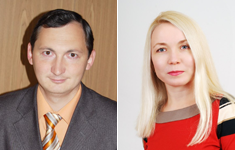Abstract
The article deals with the problem of foreign language teaching for future software engineers in higher educational establishments. Requirements of employers to applicants for engineering positions as to their linguistic competence are analyzed. Communicative competence requirements for graduates of higher educational establishments according to national branch standards for software and computer engineers are highlighted. The results of the curricula analysis of the leading national universities as to foreign language teaching are given. The aim and the contents of “English for professional purpose” course are presented, as well as described procedural guidelines of the course, its aim, structure and contents; considered some aspects of information and consultation support.References
Dx.doi.org, ‘Education at a Glance 2014: OECD Indicators, OECD Publishing’, 2017. [Online]. Available: http://dx.doi.org/10.1787/eag-2014-en. [Accessed: 23- Mar- 2017].
Nationsonline.org, ‘Countries and Languages. What language is spoken in this country?’, 2017. [Online]. Available: http://www.nationsonline.org/oneworld/countries_by_languages.htm. [Accessed: 21- Mar- 2017].
‘Internet World Stats – Usage and Population Statistics’, Internetworldstats.com, 2017. [Online]. Available: http://www.internetworldstats.com/. [Accessed: 09- Apr- 2017].
Сосновский С., Гиренко А., Галеев И., “Информатизация математический компоненты инженерного, технического и естественнонаучного обучения в рамках проекта MetaMath”. Образовательные технологии и общество, том 17, №4, сс..446–457, 2014.
Common European framework of reference for languages, 1st ed. Cambridge [etc.]: Cambridge University Press, 2011.
Стандарт вищої освіти України. Ступінь вищої освіти «Бакалавр», галузь знань 12 «Інформаційні технології», спеціальність 122 «Комп’ютерні науки та інформаційні технології». Київ, 2016.
Стандарт вищої освіти України. Проект. Ступінь вищої освіти «Бакалавр», галузь знань 12 «Інформаційні технології», спеціальність 121 «Інженерія програмного забезпечення». Київ, 2016.
H. Bakaieva, O.Borysenko, English for specific purposes (ESP): National Curriculum for Universities. K.: Lenvit, 2005.
Осадчий В., Осадча К., “Анализ проблемы профессиональной подготовки программиста и пути ее решения”. Образовательные технологии и общество, том 17, №3, cc. 362–377, .2014.
S. Desveaux. Guided learning hours. [Online]. Available: https://support.cambridgeenglish.org/hc/en-gb/articles/202838506-Guided-learning-hours. [Accessed: 01-Apr-2016].
Ferriss Т. The 4-Hour Workweek: Escape 9-5, Live Anywhere, and Join the New Rich. – Harmony, 2009. – 416 p.
Cedos.org.ua, “Кількість студентів-українців за кордоном” [Електронний ресурс]. Режим доступу: http://www.cedos.org.ua/uk/other/56-women. [Дата звернення: 02-Квіт-2016].
REFERENCES (TRANSLATED AND TRANSLITERATED)
Dx.doi.org, ‘Education at a Glance 2014: OECD Indicators, OECD Publishing’, 2017. [Online]. Available: http://dx.doi.org/10.1787/eag-2014-en. [Accessed: 23- Mar- 2017] (in English)
Nationsonline.org, ‘Countries and Languages. What language is spoken in this country?’, 2017. [Online]. Available: http://www.nationsonline.org/oneworld/countries_by_languages.htm. [Accessed: 21- Mar- 2017]. (in English)
‘Internet World Stats - Usage and Population Statistics’, Internetworldstats.com, 2017. [Online]. Available: http://www.internetworldstats.com/. [Accessed: 09- Apr- 2017]. (in English)
Sosnovskiy S., Girenko A., Galeev I., Informatisation of mathematical component of engineering, technical and liberal arts education in the MetaMath project’, Educational Technologies and Society, vol.17, no. 4, pp.446-457, 2014. (in Russian).
Common European framework of reference for languages, 1st ed. Cambridge [etc.]: Cambridge University Press, 2011. (in English)
Standard of higher education of Ukraine. Bachelor higher education level, field of study 12 “Information technology”, speciality 121 “Software engineering”. Кyiv, 2016. (in Ukrainian).
Standard of higher education of Ukraine. Bachelor higher education level, field of study 12 “Information technology”, speciality 121 “Software engineering”. – Кyiv, 2016. (in Ukrainian).
H. Bakaieva, O.Borysenko, English for specific purposes (ESP): National Curriculum for Universities. K.: Lenvit, 2005. (in Ukrainian and English).
V. Osadchyi, K. Osadcha, ‘Analysis of the problem of professional training of software engineers and ways of its solution’, Educational Technologies and Society, vol.17, no. 3, pp.362–377, 2014. (in Russian).
Support.cambridgeenglish.org, ‘Guided learning hours’, 2016. [Online]. Available: https://support.cambridgeenglish.org/hc/en-gb/articles/202838506-Guided-learning-hours. [Accessed: 01- Apr- 2016]. (in English)
T. Ferriss, The 4-hour workweek: Escape 9-5, Live Anywhere, and Join the New Rich, 1st ed. New York: Harmony Books, 2009. (in English)
Cedos.org.ua, ‘Number of Ukrainian students abroad’, 2016. [Online]. Available: http://www.cedos.org.ua/uk/other/56-women. [Accessed: 02- Apr- 2016]. (in Ukrainian).
Authors who publish in this journal agree to the following terms:
- Authors hold copyright immediately after publication of their works and retain publishing rights without any restrictions.
- The copyright commencement date complies the publication date of the issue, where the article is included in.
Content Licensing
- Authors grant the journal a right of the first publication of the work under a Creative Commons Attribution-NonCommercial-ShareAlike 4.0 International License (CC BY-NC-SA 4.0) that allows others freely to read, download, copy and print submissions, search content and link to published articles, disseminate their full text and use them for any legitimate non-commercial purposes (i.e. educational or scientific) with the mandatory reference to the article’s authors and initial publication in this journal.
- Original published articles cannot be used by users (exept authors) for commercial purposes or distributed by third-party intermediary organizations for a fee.
Deposit Policy
- Authors are permitted and encouraged to post their work online (e.g., in institutional repositories or on their website) during the editorial process, as it can lead to productive exchanges, as well as earlier and greater citation of published work (see this journal’s registered deposit policy at Sherpa/Romeo directory).
- Authors are able to enter into separate, additional contractual arrangements for the non-exclusive distribution of the journal's published version of the work (e.g., post it to an institutional repository or publish it in a book), with an acknowledgement of its initial publication in this journal.
- Post-print (post-refereeing manuscript version) and publisher's PDF-version self-archiving is allowed.
- Archiving the pre-print (pre-refereeing manuscript version) not allowed.


